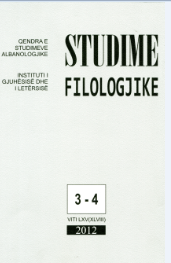MITOLOGJI ANTIKE GREKE NË PROZËN E KADARESË
GREEK ANCIENT MYTHOLOGY IN KADARE’S PROSE
Author(s): Elida QenamiSubject(s): Language and Literature Studies
Published by: Qendra e Studimeve Albanologjike
Keywords: GREEK MYTHOLOGY ; KADARE’S PROSE
Summary/Abstract: This study aims at handling that mode of Greek mythology is utilized in the works of the greatest writer of the Albanian mythology of the second half of the 20 century, in the works of I. Kadare. Thus, this study aims at attempting to interpret the myths coverage in the literary works of Kadare as well as in the papers with aesthetic and critical traits. The questions whose answers we are striving to give are as follows: How does Greek myth emerge in Kadare’s works? How is this trend shown, as undoing mythology or as recreation? What proportion stands myth in, with the literary text created by the author? Are there obvious preferences in the usage of myth in Kadare’s works and which are they? In major part of his works with mythological nature, 1. Kadare is in the favour of the ancient Greek myth. The preference toward the Greek myth is a preference towards the treated thematic in the great works of the Greek tragedians. Their atmosphere perfectly adjusts to the literature, Kadare writes about: a literature closely connected to with tyranns psychosis, war about power, state’s crime, anxiety, fear, etc. This mythology appears in the work with the names of of the myths ‘genesis: while some of them are displayed as double character with modernized form. fhe genesis of the myths in prose is Troy. And the entire tragedy of hers. In the short stories ‘The Troy falT and furthermore in the novel uThe Monster”, Ismail Kadare brings on another proceeding on myth: recreation in the form of metatext. At ‘The deceiving dream”, the myth gets actualized by means of the two symbolic aspects at Tn front of the restroom”, Ismail Kadare attempts through intertextuality to reconstruct the Agamemnon’s assassination Wereas in the triology ‘'Trometheus”, Kadare draws an analogy between his fate and PrometheusTate. In the short story “Sfinxs night”, Kadre overthroghs the mythologic variant to underline the view that totalitarism is generated by tyrann’s atrocities. Proceedings with the myth are proceedings with the time. The linear time and the cyclic time are constantly intertwined. In the mythological novels the myths serve as eternal totemic symbols that set up bridges between the beautiful and the ugly, of the goods and the evil, of the low and the high. These myths serve to Kadare in the order to read between the lines of the modern era, and this is the highest merit of the autor.
Journal: Studime Filologjike
- Issue Year: 2012
- Issue No: 03-04
- Page Range: 165-183
- Page Count: 19
- Language: Albanian

